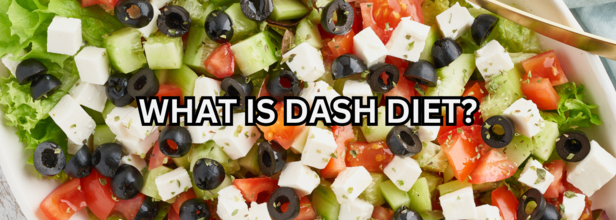- Health Conditions A-Z
- Health & Wellness
- Nutrition
- Fitness
- Health News
- Ayurveda
- Videos
- Medicine A-Z
- Parenting
DASH Diet Earns Top Spot In 2025 US, Know What It Is

Credits: Canva
2025 has just begun and we already have a best diet with us, well, the second-best. As per the US News & World Report's Best Diets ranking by examining 38 types of diets in 21 categories, the DASH diet or the Dietary Approaches to Stop Hypertension developed by Pennington Biomedical Research Center scientists, earns the second position.
The DASH diet is known as one of the most heart-healthy diets that is known for fighting blood pressure. As per Dr John Kirwan, Executive Director of Pennington Biomedical, "The DASH Diet was developed by some of our Pennington Biomedical pioneers, with Dr. George Bray, Dr. Donna Ryan and Dr. Catherine Champagne among the lead developers in the DASH Diet Collaborative Research Group. Thirty years after its development, the DASH Diet has stood the test of time and is a proven eating plan with numerous health benefits. Pennington Biomedical is proud of our history and role in the DASH Diet."
The DASH diet has not just made it to the top best diets overall, but it has also second the first rank for being the best heart-healthy diets and best diets for high blood pressure. It got a second position for best diets for high cholesterol, prediabetes, healthy eating, and gut health. It secured third position for best diabetes diets and best diets to follow. Lastly, it secured fourth position for best diets for mental health, menopause, arthritis, and brain health.
What is DASH?
The DASH diet was created after researchers noticed that high blood pressure was much less common in those who followed a plant based diets, vegans and vegetarians. This is why DASH diet mostly consists of fruits and vegetables. In terms of lean protein it includes chicken and fish. The diet is low in red meat, salt, added sugars and fat.
ALSO READ: The Best Diet To Opt For In 2025
As per the 2023 study by Hima J Challa, et.al., published in the National Library of Medicine's National Center for Biotechnology Information, scientists believe that the main reason people with high blood pressure benefit from this diet is because it reduces salt intakes. Which means you cannot have no more than 3/4 teaspoon (tsp), which is around 1,500 milligrams (mg) of sodium per day.
What are the benefits of this diet?
Different studies published on the National Heart, Lung and Blood Institute in a review from December 2021, titled The Science Behind the DASH Eating Plan, mentions that DASH diet is effective in reducing blood pressure.
Another 2020 study titled A Calorie-Restricted DASH Diet Reduces Body Fat and Maintains Muscle Strength in Obese Older Adults, states that following DASH has helped older adults over 65 with obesity reduce body fat.
Furthermore, a 2019 review published in the Journal of American Nutrition by Mohammad Ali Mohsenpour, et.al., also found that people who followed the DASH diet had a lower risk of cancer. These cancers including breast, hepatic, endometrial, and lung cancer.
A different 2019 study titled Association between the DASH diet and metabolic syndrome components in Iranian adults found that it also reduces your risk of metabolic syndrome by 50%. The diet also finds links to lowering the chance of diabetes as found in the 2023 study by Thomas M Campbell, et.al..
Among the last of the many more benefits, a 2019 study by Laura Chiavaroli, et.al., found that following DASH can be linked to lower chance of developing heart diseases.
What can you eat in DASH?
- More fruits and vegetables
- More whole grains, less refined grains
- Fat-free or low fat dairy products
- Lean protein
- Vegetable oil for cooking
- Limit intake of sugar, soda, candy
- Limit intake of saturated fats like fatty meats, processed foods, full-fat dairy, and oils like coconut and palm oil
How Long Does It Take To Detox From Alcohol?

Credits: iStock
It is that time of the year, when you will be partying, waking up hungover, and partying again. However, it is important to understand that such a habit takes a toll on you. How long alcohol stays in your body depends on how much you drank and how fast your system processes it. In general, the liver can break down roughly one standard drink per hour. Still, traces of alcohol can show up in tests even 24 hours later. A standard drink usually means about 12 ounces of beer, 4 ounces of wine, or 1 and a quarter ounces of distilled spirits. The more you drink, the longer your body needs to clear it.
Most of the alcohol you consume is processed by the liver. Small amounts leave through urine, sweat, and breath, but there is no shortcut to speed this up. Coffee, cold showers, or fancy detox drinks do not flush alcohol out faster. Time is the only real detox. Giving your liver space to do its job is key.
If someone has been drinking heavily for a long period and suddenly stops, detox can come with withdrawal symptoms. These can range from mild discomfort to serious complications. In some cases, withdrawal can be life threatening, which is why medical supervision is strongly advised for people with a history of heavy drinking.
How Long Can Alcohol Be Detected?
Alcohol stays detectable in the body for different lengths of time depending on the test used and individual factors like age, sex, body weight, food intake, and medications. Urine, breath, and blood tests can usually detect alcohol for 12 to 24 hours after drinking. Hair tests are different and may show alcohol use for up to 90 days.
In most parts of the United States, driving with a blood alcohol concentration of 0.08 grams per deciliter or higher is illegal because it affects judgment and vision. Utah has a lower legal limit of 0.05. Even if you feel sober, alcohol can still be present in your system.
What Happens During Alcohol Detox?
For people with alcohol use disorder or long term heavy drinking habits, withdrawal symptoms may start around eight hours after the last drink. These symptoms often peak between 24 and 72 hours and usually ease within five to seven days. Some psychological effects like anxiety or cravings can last longer.
Early symptoms often include nausea, anxiety, poor sleep, and stomach pain. More severe symptoms can involve high blood pressure, confusion, fever, hallucinations, or seizures. Because of these risks, detoxing in a medical setting is often the safest option. Doctors may prescribe medications to manage symptoms and prevent complications.
Tips for a Safer Detox
If you are cutting back or quitting alcohol, start by talking to a healthcare professional, especially if your drinking has been heavy. Take things one day at a time and focus on small, realistic goals. Choose a calm and supportive environment and avoid triggers that make you want to drink.
Hydration matters. Alcohol dehydrates the body, so water, herbal teas, and electrolyte drinks can help reduce headaches and fatigue. Nutrition also plays a big role. Balanced meals with fruits, vegetables, whole grains, and protein support recovery. Foods rich in B vitamins and magnesium are particularly helpful.
Avoid replacing alcohol with other substances like excessive caffeine or nicotine, as this can worsen stress and cravings. If you notice signs of alcohol dependence, reaching out for professional help is a strong and positive step. Detox is only the beginning, but with the right support, recovery is possible.
At 66, Emma Thompson Lost 8kg by Ditching Diet Culture; Why Say This Approach Works

Credits: Wikimedia Commons
Dame Emma Thompson believes that eating well is never about punishment, food guilt, or obsessively tracking every bite. So what did she do to lose 8 kgs? She ditched diet.
Instead, she follows what she openly calls an “anti-diet” approach. It is not about restriction but awareness. She pays attention to what she eats, fuels her body properly, and still makes space for the foods she genuinely enjoys. That balance is exactly why the method has worked for her long term.
A couple of years ago, the 66-year-old actor and screenwriter lost around 8kg without falling into the trap of rigid rules or trendy superfoods. Rather than cutting entire food groups, Emma focused on consistency, structure, and realism. The result was not just weight loss, but better energy and a healthier relationship with food.
What the Anti-Diet Plan Looks Like in Real Life
Emma worked with Louise Parker, a trainer and nutrition coach known for promoting sustainable habits over quick fixes. The plan itself was calorie-controlled but far from extreme. It included three regular meals a day, each centered on protein to support muscle and keep hunger steady. These meals were paired with slow-digesting carbohydrates such as whole grains, vegetables, and fruit, along with healthy fats for satiety. Two snacks were also built into the day, removing the feeling of deprivation that often leads to overeating later.
The idea was not perfection, but rhythm. Eating regularly helps stabilise blood sugar, reduces cravings, and prevents the binge-restrict cycle that derails many diets. This structure alone can make a significant difference for people who have spent years jumping between extremes.
Why Enjoying ‘Forbidden’ Foods Matters
One of the most refreshing aspects of this approach is that no food is completely off-limits. Emma has spoken openly about enjoying things like cheese, bacon, and even wine occasionally. This is not indulgence for the sake of it. It is a strategic choice.
When people label foods as “bad,” they often end up craving them more. Allowing flexibility removes that psychological pressure. Interestingly, many foods marketed as healthy can be more calorie-dense and less satisfying than traditional options. By eating foods she actually enjoys, Emma avoided the constant feeling of missing out, making the plan easier to maintain over time.
A Rejection of Crash Diet Culture
Emma’s resistance to dieting is deeply personal. Earlier in her career, she tried crash diets and paid the price. She has spoken candidly about how dieting disrupted her metabolism and negatively affected her mental health. Like many people, she was sold the promise of quick results, only to experience long-term consequences.
This honesty highlights an important truth. Extreme restriction may deliver short-term weight loss, but it often damages the body’s ability to regulate hunger and energy. It also fuels a harmful cycle of guilt and rebound weight gain.
The Role of Exercise and Lifestyle Habits
Food was only one part of the equation. Emma also followed an intense fitness routine that included resistance training and ballet-inspired movement. Strength training plays a crucial role in preserving muscle mass, improving metabolism, and supporting long-term weight management. Alongside exercise, sleep, recovery, and mental wellbeing were treated as non-negotiables rather than afterthoughts.
Why This Approach Is Easier to Stick To
Behavioral science consistently shows that
sustainable change comes from habits that fit into real life. Flexible eating patterns that allow enjoyment, regular meals, and adequate nourishment reduce reliance on willpower. When people stop viewing food as the enemy, consistency becomes far more achievable.
Emma Thompson’s “anti-diet” approach works because it respects both biology and psychology. It replaces punishment with practicality, and restriction with balance. That combination is what turns healthy eating from a temporary phase into a lifestyle that actually lasts.
Christmas Delights Mince Pies Urgently Recalled In UK, Know Why

Credits: Canva
Mince pies, a Christmas delight, has been recalled just a few hours before Christmas in UK, over dangerous 'health risks'. The Food Standards Agency (FSA) warned consumers that there could be certain allergies and intolerances that could occur.
Why Are Mince Pies Recalled?
Shallow Brandy Mince Pies by the Bakewell baker have been recalled because it contains milk, "which is not mentioned on the label", noted the FSA notice, issued on December 23.
"The product is a health risk for anyone with an allergy or intolerance to milk or milk constituents," read the FSA notice.
The affected batch include six packs with the following best before dates: 2 February 2026, 3 February 2026, 4 February 2026, and 5 February 2026.
What Does The FSA Notice Say?
Why is the product being recalled?
We have identified that it has been labels incorrectly. Allergen missing. Product contains
milk not declared labels an ingredient has. This may pose a risk to customers.
What should customers do?
Please call the office.
• If you have purchased this product, please do not consume it.
• Return it to the store where it was bought for a full refund. No receipt is required.
FSA issued a "do not consume" notice to warn customer who could be affected.
What Happens When Lactose Intolerant People Consume Milk Or Milk Based Products?
When lactose intolerant people consume milk or milk-based products their bodies cannot properly digest the lactose sugar, leading to uncomfortable digestive symptoms like gas, bloating, cramps, abdominal pain, rumbling sounds, nausea, and diarrhea, usually within 30 minutes to 2 hours, because the undigested lactose ferments in the gut. Severity varies by individual, but it's generally a harmless condition, manageable by limiting dairy or using lactase supplements, and is different from a milk allergy.
Common Symptoms
- Gas & Bloating: Bacteria in the large intestine ferment the lactose, producing gas and causing the gut to stretch.
- Cramps & Pain: Fermentation creates acids and gases, leading to pain around the navel and lower abdomen.
- Diarrhea: Excess water and gas in the colon can result in loose stools.
- Nausea & Vomiting: Some people experience nausea or may even vomit.
- Stomach Noises: You might hear rumbling or "growling" sounds
However, not everyone is lactose intolerant, some may have an allergy from milk, which could lead to different allergy symptoms, which include:
- Hives
- Skin rash
- Stomach upset
- Runny Nose
In fact, severe symptoms could also lead to wheezing, throat swelling, difficulty breathing, vomiting, anaphylaxis.
Are There Any Alternatives To Mince Pies?
There are mince pies available without milk or using any dairy. These dairy-free pastry, which are often made with vegetable oils or vegan butter substitute plant-based milk for brushing, or skipping the milk wash entirely. Traditional pie crusts use ice water as the liquid, so replacing milk is easier.
Always pay attention to be label to know if it contains any ingredient you may be allergic to.
© 2024 Bennett, Coleman & Company Limited

